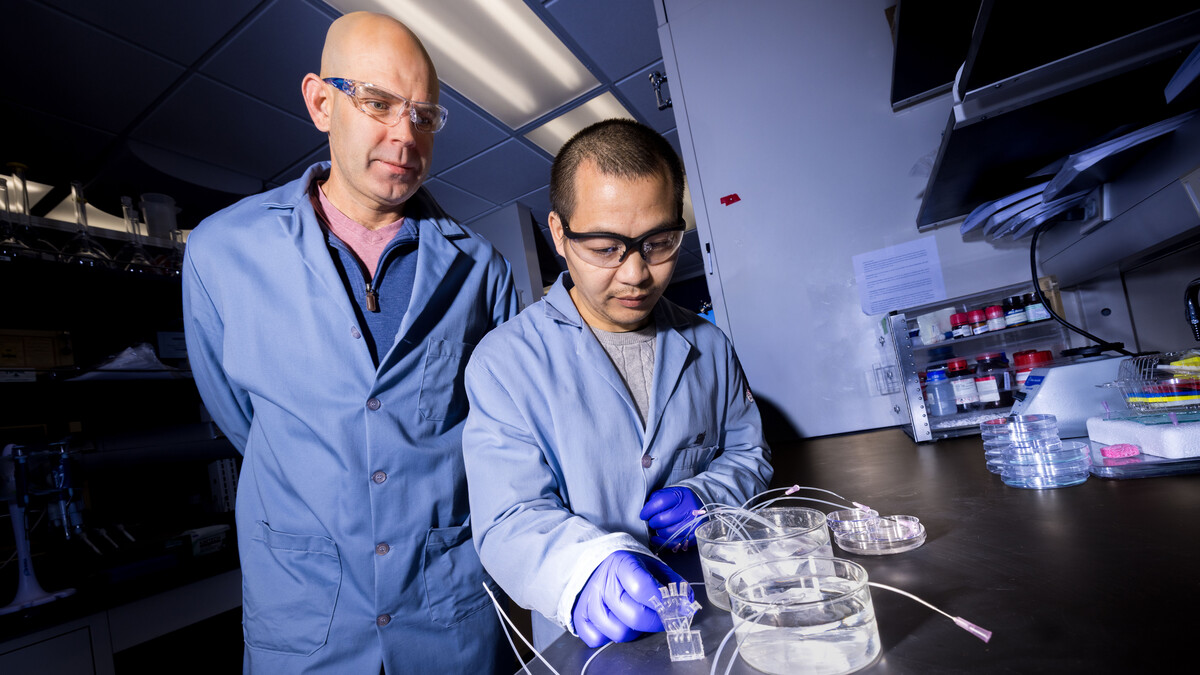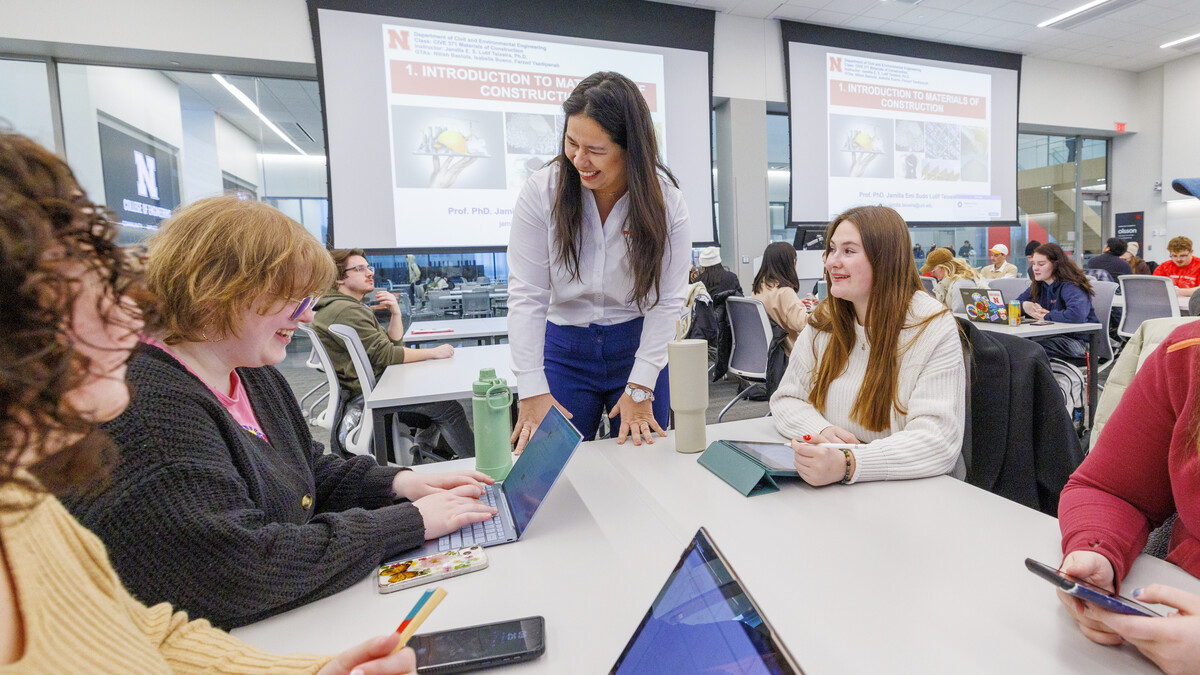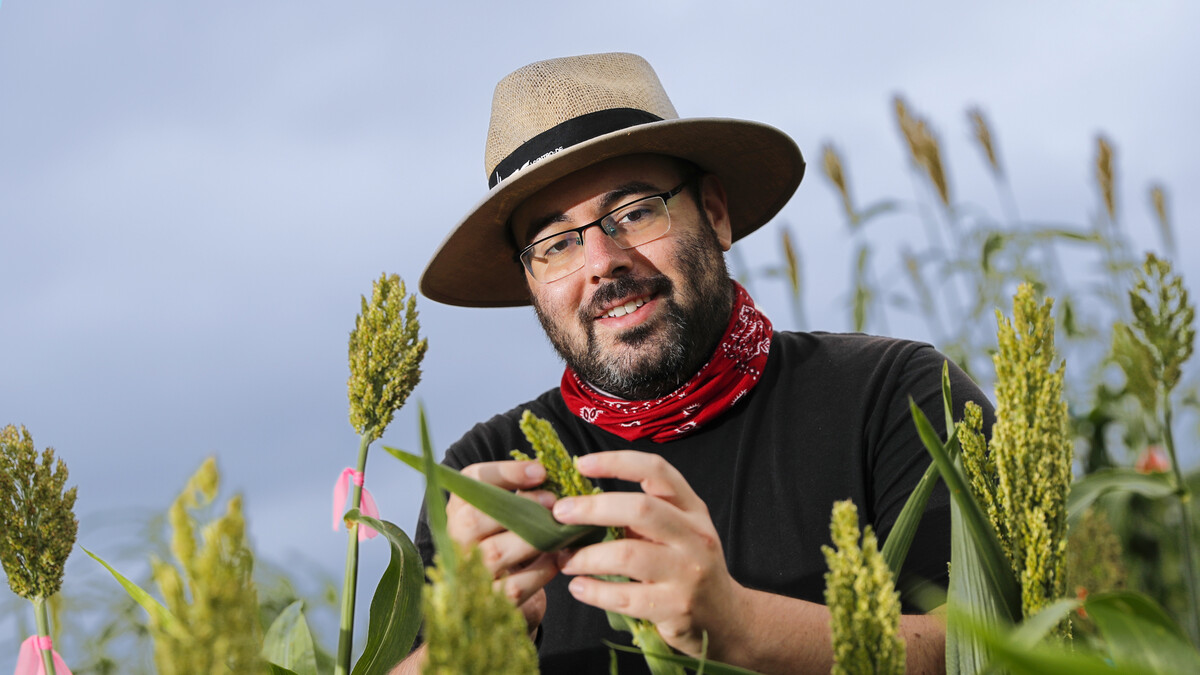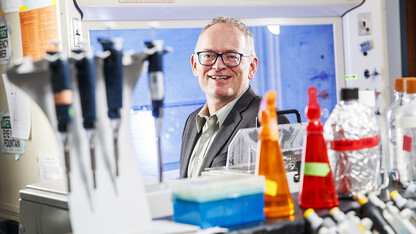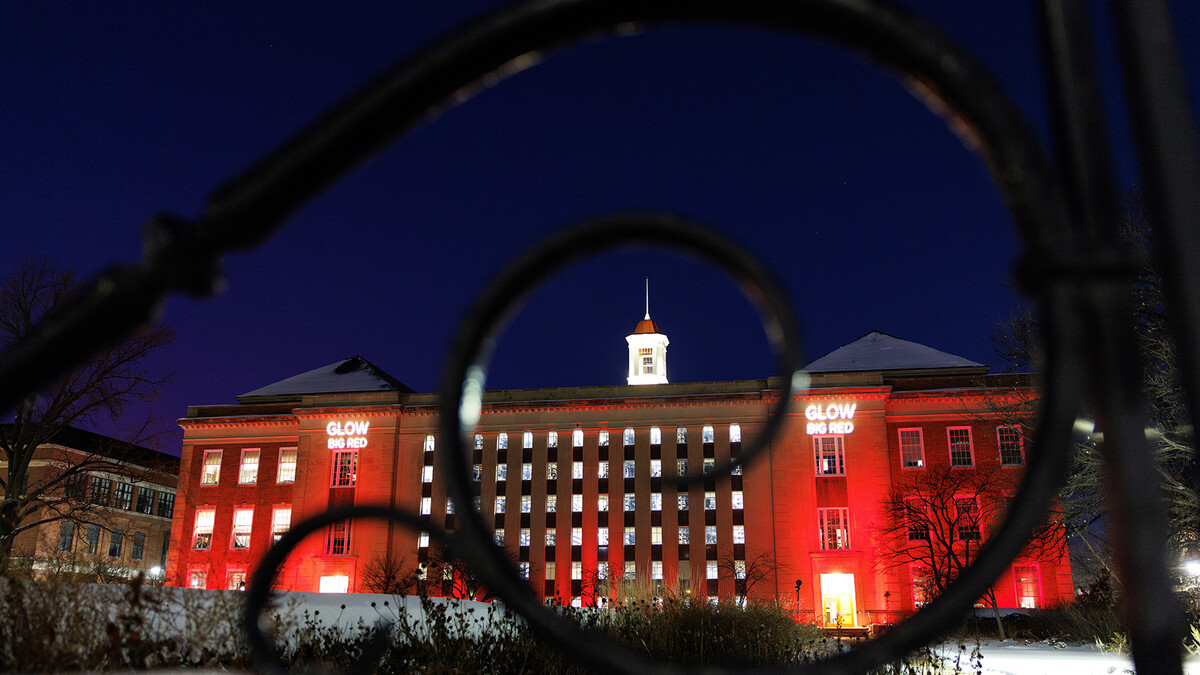
Kristen Labadie | University Communication and Marketing
Kristen Labadie | University Communication and Marketing
Two University of Nebraska–Lincoln faculty members were interviewed for national news stories on parasites in the brain and a new Russian space threat. The stories were among 65-plus featuring Husker faculty, staff, students, centers and programs in May.
- Scott Gardner, professor of biological sciences and curator of the Manter Laboratory of Parasitology at Nebraska, was interviewed for a pair of May 8 New York Times articles (1, 2) on presidential candidate Robert F. Kennedy Jr. suffering cognitive issues more than a decade ago, possibly from a parasite in his brain. Gardner said that once a worm is in the brain, cells calcify around it. “And you’re going to have basically almost like a tumor that’s there forever,” he said. “It’s not going to go anywhere.” Gardner said it is possible a worm could cause memory loss. He was also interviewed on the topic for CNN’s “OutFront” with Erin Burnett and Time magazine.
- Jack Beard, associate professor of law and director of the Space, Cyber and National Security Law program, was interviewed for a May 23 Forbes article on how Russia launching a nuclear-tipped anti-satellite missile into orbit could spark a great-power conflict. “Given that so many critical military assets are now located in orbit, a strong argument could be made that the next world war between the superpowers is going to begin in space, particularly in the sense that the first shot is likely to be fired there,” he said.
Also worth noting
- A novel study from the Center for Brain, Biology and Behavior at Nebraska and the University of Illinois at Urbana-Champaign has identified a specific nutrient profile in study participants who performed better cognitively. The profile is correlated with nutrients found in the Mediterranean diet, which research has previously associated with healthy brain aging. Stories on the study appeared in BBC Science Focus, the Independent, Inverse, New Atlas, NBC’s “Today” and 150-plus other media outlets.
Additional national news coverage in May included:
- Plant life first emerged on land about 550 million years ago, and an international research team co-led by Yanbin Yin, food science and technology, has cracked the genomic code of its humble beginnings, which made possible all other terrestrial life on Earth, including humans. Stories on the research appeared in KOLN/KGIN, Earth.com, Interesting Engineering and New Atlas.
- Kristen Blankley, law, was interviewed for a May 2 Bloomberg Law article on the California Court of Appeal, Fourth District, considering whether pharmacy benefit manager OptumRx Inc. can dramatically limit its legal exposure with one of big business’s favorite tools: limited arbitration. The high-cost and low-discovery provisions in the Optum agreement could be considered “draconian,” she said. These outliers could give courts pause when reviewing their agreements.
- Ana Maria Vélez, entomology, is pioneering a genetic technology to contain the western corn rootworm, which annually causes up to $2 billion in yield loss and control costs in the Corn Belt. The research seeks to contain agricultural pests by targeting rootworm genes. The Fence Post ran a May 3 article on the research.
- A groundbreaking ceremony took place May 6 for the U.S. Department of Agriculture’s National Center for Resilient and Regenerative Precision Agriculture, to be built on Nebraska Innovation Campus. Stories on the groundbreaking appeared in at least eight Nebraska media outlets, as well as Ag Day, Biodiesel Magazine, Brownfield Ag News, CropLife, Feedstuffs, The Fence Post, High Plains Journal, New Food magazine and several other media outlets.
- William G. Thomas III, history, Angle Chair in the Humanities and associate dean for research and graduate education in the College of Arts and Sciences, was cited in a May 7 Baltimore Sun article on some people calling for the Francis Scott Key Bridge to be renamed. Key represented enslaved families in some freedom suits, but later made public comments that disparaged Black freedom and suggested he regretted his role in those lawsuits, Thomas said. Yahoo! News picked up the article.
- Hannah Guenther, Extension educator for food, nutrition and health, was featured in a May 7 segment on RFD-TV. She discussed the nutritional benefits of beef in honor of National Beef Month.
- Dawn O. Braithwaite, Willa Cather Professor of Communications Studies Emerita, was interviewed for a May 8 New York Times article on “kinkeeping,” or the work of keeping a family connected. She said that kinkeepers often find themselves “stuck in the middle” of complicated family dynamics or playing the role of gatekeepers of important family information — which can come with power, but also stress. (This article requires a subscription.)
- The Lied Center for Performing Arts announced the remainder of its 2024-25 season May 8. Highlights include the musical “Dear Evan Hansen,” Step Afrika!, the Preservation Hall Jazz Band, a Johnny Carson birthday celebration, an “Encanto” sing-along, Parsons Dance and Itzhak Perlman. Stories on the announcement appeared in at least five Nebraska media outlets and Broadway World.
- The latest Heuermann Lecture, “Innovations in Agricultural Technology: Cultivating Tomorrow’s Farms,” on May 29, featured industry leaders, entrepreneurs and innovators exploring the cutting-edge solutions shaping the future of agriculture. Stories on the lecture appeared in Rural Radio Network, Beef magazine and The Fence Post.
- Chigozie Obioma, English, wrote a May 9 guest column for The Economist titled “Chigozie Obioma laments the West’s growing ideological tribalism.” (This article requires a subscription.)
- Obioma was featured in a May 27 New York Times article. He discussed his childhood dream of being a pro soccer player, his path to becoming a writer and his new novel, “The Road to the Country.” Reviews of the book, to be released June 4, have appeared in Financial Times, The Guardian, Publishers Weekly and The Wall Street Journal. Obioma’s two previous novels, “The Fisherman” and “An Orchestra of Minorities,” were finalists for the prestigious Booker Prize.
- Obioma also wrote a May 30 piece for Esquire on his writing influences.
- The Nebraska Women in Agriculture program, along with the Nebraska Beef Quality Assurance Program, will host the fourth annual Herd That! Conference June 10 and 11 at the West Central Research, Extension and Education Center in North Platte. The Scottsbluff Star-Herald and Beef magazine ran articles on the event.
- In a new study, Ciera Kirkpatrick, advertising and public relations, found that new mothers with a higher social comparison orientation — or tendency to compare oneself to others — were more negatively affected by idealized portrayals of motherhood than those with a lower such orientation. Stories on the research appeared in KOLN/KGIN, Nebraska Public Media, Motherly, the New York Post, Study Finds and the Toronto Star.
- John Hibbing, professor emeritus of political science, was interviewed for a May 13 Associated Press article on the Nebraska Republican Party refusing to endorse any of the Republican incumbents who hold all five of the state’s congressional seats. The situation reflects the bitter divide between Donald Trump loyalists who control the Nebraska GOP, as well as several county Republican parties, and the more establishment-type Republicans previously at the helm, Hibbing said.
- A July 2023 report by Husker agricultural economists Jeffrey Stokes and Jim Jansen was highlighted in a May 15 Chicago Tribune article on Illinois corn farmers turning to the aviation industry as a possible market for ethanol. As electric vehicle production increases, the resulting decline in the value of Midwest farmland and corn prices will hurt farmers and have ripple effects across rural communities, the report suggested. (This article requires a subscription.)
- Kevin Smith, political science, was a featured guest on the May 15 episode of the American Psychological Association’s “Speaking of Psychology” podcast. The topic was how to cope with political stress this election season.
- Smith was also interviewed for a May 20 USA Today article on Nebraska’s primary election results. He said the Nebraska Republican Party’s decision not to endorse any of the state’s congressional incumbents reflects the split in the political party nationwide.
- Vinodchandran Variyam, School of Computing, has helped create an algorithm that uses randomization to approximate the number of distinct entries in a long list. The CVM algorithm, which he created with Sourav Chakraborty of the Indian Statistical Institute and Kuldeep Meel of the University of Toronto, is a significant step toward solving the distinct elements problem, which computer scientists have grappled with for more than 40 years. Quanta Magazine published a May 16 article on the algorithm.
- Michael Tross, a recent doctoral graduate in complex biosystems, was interviewed for a May 17 Midwest Messenger article on the growing use of artificial intelligence to answer farmer’s questions. “AI models are being trained on large and diverse information to answer common agronomic questions,” he said. “It almost appears that you are speaking to a real person.”
- Kait Chapman, an urban entomologist with Nebraska Extension, was interviewed for a May 20 CNN story on ticks. She recommended removing an embedded tick with a pair of tweezers, securing it by its head as close to the skin as possible and pulling it straight out. She also suggested preventing tick bites by covering one’s skin and tucking one’s pant legs into one’s socks, as well as throwing clothes worn outdoors in a hot dryer for a half-hour as soon as one arrives home.
- Elizabeth Theiss-Morse, political science, co-wrote a May 21 op-ed for Inside Higher Ed with the University of North Carolina at Chapel Hill’s Jeff Spinner-Halev calling for the revival of civic respect on college campuses. They wrote that civic respect means listening in both interpersonal and impersonal ways to those with different views; avoiding political stereotyping; and not assuming that citizens who vote differently do so because they are poorly informed, ignorant or misled. Theiss-Morse and Spinner-Halev are co-authors of the new book “Respect and Loathing in American Democracy: Polarization, Moralization and the Undermining of Equailty.”
- Dean Sicking, professor emeritus of civil and environmental engineering, has earned the Landmark Award for Outstanding Contributions to NASCAR. Sicking and colleagues at the university’s Midwest Roadside Safety Facility invented the SAFER (Steel and Foam Energy Reduction) barrier, which has saved countless lives over the past 20 years. Stories on the award appeared in CBS Sports, Forbes, USA Today, Yahoo! Sports and several other media outlets.
- Patrice McMahon, political science, director of the University Honors Program, wrote a May 24 piece for The Conversation titled “Why Poland’s new government is challenged by abortion.” Poland’s three main coalition partners — the Civic Coalition, the Third Way and The Left — all want to soften the country’s near-total abortion ban but disagree on how this should happen and how far the changes should go, she wrote. The article was picked up by U.S. News and World Report, Yahoo! News and several other media outlets.
- The university’s Soil Judging Team took home six awards — including second place for overall team — at the National Soil Judging Contest, hosted by Iowa State University. Articles on the accomplishments appeared in the North Platte Telegraph, The Fence Post and Tri-State Livestock News ran articles on the accomplishments.
- Slim Chickens will open a location at the university this fall, Franchising.com and QSR magazine reported May 29. It is the restaurant chain’s sixth campus location and second with a self-operated dining service. Dave Annis, director of dining services at Nebraska, was quoted in the stories.
- Brandon Johnson, assistant professor of law, was interviewed for a May 30 CBS News article on how former President Donald Trump’s New York felony conviction could affect his ability to serve as president, if elected. Johnson discussed how the 25th Amendment of the U.S. Constitution could come into play, depending on the outcome of Senate elections. He wrote an April 2023 essay on the topic for the Harvard Law Review, which was referenced in the article.
- On May 30, RFD-TV aired a Market Journal story on the Nebraska LEAD (Leadership Education/Action Development) Program, which helps develop ag leaders in the state. Director Terry Hejny, who will retire in June, was interviewed for the story.
- Judith Turk, School of Natural Resources, will use an $854,000 grant from the National Science Foundation’s Faculty Early Career Development Program to shed light on how human activity is impacting soil degradation in the Great Plains. The Fence Post ran a May 30 article on the research.
Faculty, administration, student and staff appearances in the national media are logged at http://newsroom.unl.edu/inthenews. If you have additions to the list, contact Sean Hagewood at shagewood2@unl.edu or 402-472-8514. If you have suggestions for national news stories, contact Leslie Reed at lreed5@unl.edu or 402-472-2059.



